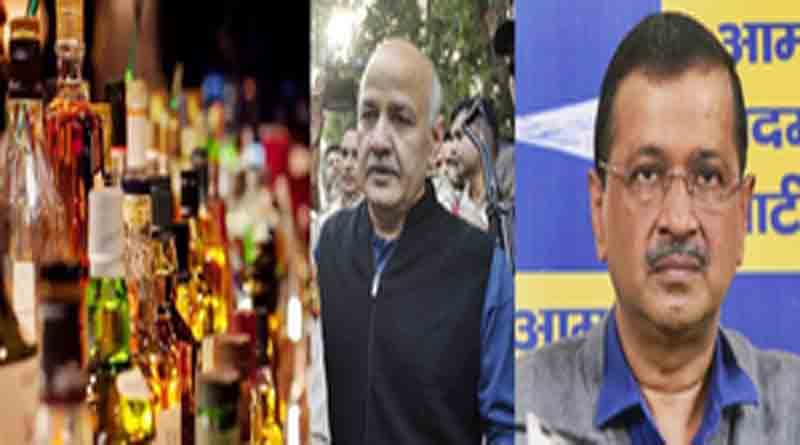Delhi Liquorgate: CAG report shows Rs 2,002 cr loss, non-achievement of objectives
Insight Online News
New Delhi, Feb 25 : The Comptroller and Auditor General of India (CAG) report tabled in Delhi Assembly on Tuesday said that former Chief Minister Arvind Kejriwal and his ministers allegedly caused a loss of over Rs 2,002 crore through their non-transparent excise policy, popularly known as “Liquorgate”.
Pointing to illegal decision-making to benefit some favoured licencees, the damning report said, “Actual implementation was sub-optimal and objectives behind the policy were not achieved. Vends in non-conforming wards could not be opened and equitable distribution of retail vends could not be achieved. Issue and management of zonal licences had major shortcomings.”
The document of the Central government’s auditor that has exposed the liquor scam is named, ‘Report of the Comptroller and Auditor General of India on Performance Audit on Regulation and Supply of Liquor in Delhi.’
The scam related to the now-scrapped excise policy was a key issue in the just-concluded Assembly Elections, with even Prime Minister Narendra Modi promising to expose the corrupt by announcing, “Jinhone loota hai, unhe lautana padega (The looters will have to pay back every penny).”
On Tuesday, the CAG report was table by Chief Minister Rekha Gupta amid thumping of desks by BJP legislators even as Lieutenant Governor V.K. Saxena promised to study the CAG findings and improve the system.
Earlier, corruption and money-laundering cases related to the now-withdrawn excise policy saw Kejriwal and his Cabinet colleagues – Manish Sisodia and Satyendar Jain – spend months behind bars, before getting bail from court.
The findings of the Comptroller and Auditor General of India, Girish Chandra Murmu also highlight the areas in which it failed to achieve its stated purposes.
These failed objectives included: Generate optimum revenue for government, eradicate sale of spurious liquor, simplify excise regime, counter formation of cartels, simplify duty and pricing policy and adequate spread of retail vends.
“Responsibility and accountability should be fixed for the lapses observed and the enforcement mechanism should be strengthened,” said Murmu in his final recommendation in the report for the year ended March 31, 2022. The report was also signed by Principal Accountant General (Audit), Delhi, Aman Deep Chatha.
Under the head of “Decisions taken without the approval of competent authority”, the CAG report included opening of liquor vends in conforming areas like residential areas or close to places of worship or schools.
The report also slammed the previous government for relaxation regarding coercive action against the licencees in case of default of payment of fee, waiver or reduction in licence fee, refund of earnest money deposit in case of Airport Zone and correction in formulae for calculating MRP in case of foreign liquor.
The CAG report also underlined the fact that a report of group of AAP ministers deviated from the recommendations by an expert committee for drafting a new excise policy.
One of the glaring lapses by the GoM was allowing one applicant to get allotment of up to 54 retail vends as compared to the expert panel’s suggestion that an individual may be allotted a maximum of two vends.
The CAG also flagged the provision in the now-scrapped excise policy to allow retail licencees to offer discounts to customers.
Another key finding was the non-setting up of labs to check the quality of liquor being supplied in Delhi, a lapse that exposed millions of city residents to health risks, said the CAG report.
The government auditor’s report tore into the AAP government’s policy-making and implementation, citing several instances of irregularities like – lack of transparency in pricing, violation in issue and renewal of licences, non-penalisation of violators, non-seeking of approval from LG, Cabinet or the Assembly.
The CAG report said the exchequer lost around Rs 890 crore as the AAP government did not re-tender the surrendered retail liquor licences.
The report noted, “There was lack of scrutiny of the business entities with regards to their financial wherewithal and management expertise. Instances of related business entities holding licenses across the liquor supply chain were noticed.”
“Liquor supply data indicates exclusivity arrangements between zonal licencees and wholesalers and Brand Pushing. Surrender of zonal licences during the extended policy period further led to substantial revenue loss. Other important measures which were planned in the policy, like setting up of laboratories and batch testing for quality assurance, setting up of super premium vends etc., were not implemented,” it said.
The government lost an additional Rs 941 crore due to the exemptions that had to be given to the zonal licencees, the report said.
The GoM, headed by Minister Manish Sisodia, allegedly did not act on the recommendation of the expert panel and even allowed disqualified entities to bid for licences.









